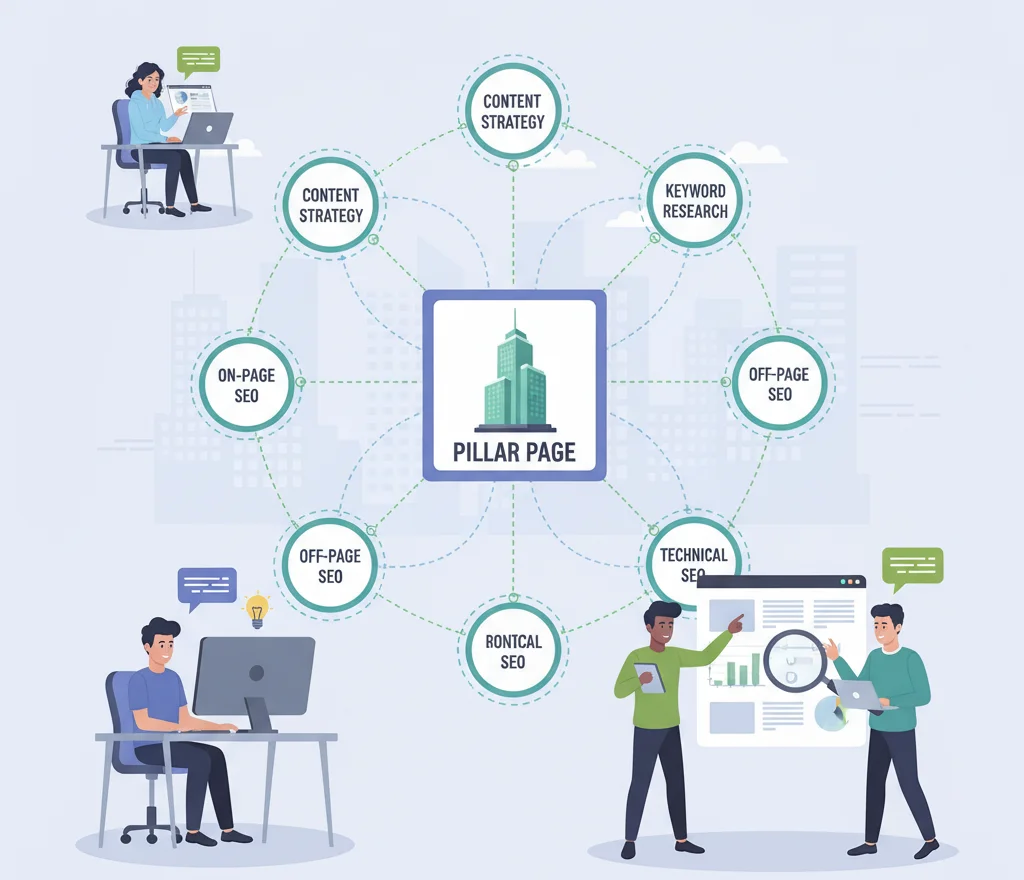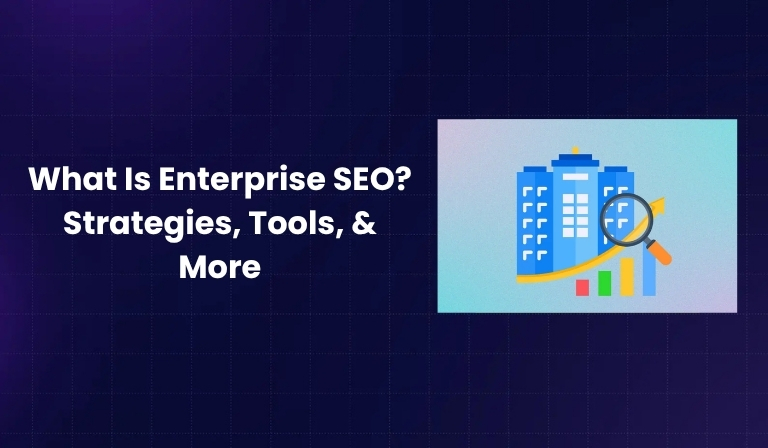As businesses grow online, so does the complexity of their websites and marketing efforts. This is where enterprise SEO comes in. It’s not just regular SEO on a bigger scale—it’s a structured, strategic, and scalable approach to optimizing websites that have thousands or even millions of pages.
In this blog, you’ll learn what enterprise SEO is, why it matters, which strategies work best, what tools to use, and how to implement it for long-term growth.
What Is Enterprise SEO?

Enterprise SEO is the process of optimizing large-scale websites to improve their visibility in search engine results. These websites often belong to corporations, global brands, or eCommerce platforms with thousands of product or service pages.
Key Characteristics:
- Massive site size with thousands of URLs
- Multiple teams and departments involved
- High competition and broad keyword targeting
- Focus on scalability, automation, and consistency
How It Differs from Traditional SEO:
| Feature | Traditional SEO | Enterprise SEO |
| Site size | Small to medium | Very large and complex |
| Manual work | Manageable | Requires automation |
| Team structure | One or few SEO experts | Cross-functional enterprise teams |
| SEO goals | Simple goals (traffic, leads) | Business-wide KPIs and revenue |
Why Enterprise SEO Matters
Enterprise SEO plays a crucial role in helping large businesses maintain and grow their organic presence online. Here’s why it matters:
- Drives consistent organic traffic across thousands of pages
- Maintains brand visibility across different markets or regions
- Supports marketing and sales objectives at scale
- Improves ROI through cost-effective long-term traffic
- Helps outperform competitors in search results
Core Components of Enterprise SEO
1. Technical SEO at Scale

Large websites require robust technical SEO to ensure that search engines can crawl and index pages effectively.
- XML sitemaps and robots.txt setup
- Fixing crawl errors and broken links
- Managing duplicate content and canonical tags
- Optimizing page speed and mobile performance
2. Content Strategy

Creating high-quality content at scale is key.
- Identify content gaps across categories
- Target long-tail and transactional keywords
- Create templates for product and service pages
- Maintain a consistent brand voice across all pages
3. On-Page Optimization

Optimizing metadata, headers, and internal linking across thousands of pages requires scalable methods.
- Automate meta tags and titles
- Implement structured data (schema markup)
- Use dynamic internal linking strategies
4. Off-Page SEO

Enterprise link building is more than just guest posts.
- Earn links from high-authority publications
- Build a strong online reputation
- Partner with influencers and thought leaders
5. Local & International SEO
Many enterprise businesses operate in multiple locations and countries.
- Use local landing pages for each location
- Implement hreflang tags for international audiences
- Customize content and keywords for different regions
Key Enterprise SEO Strategies

Implementing SEO at scale requires smart planning and the right strategies:
Scalable Keyword Research
Use tools to uncover keyword opportunities for each section of the site. Group keywords by intent, region, and product.
Automation
Automate repetitive tasks like metadata updates, site audits, and rank tracking.
Cross-Departmental Collaboration
Coordinate efforts between SEO, dev teams, content creators, and marketing departments.
Performance Monitoring
Set clear KPIs—traffic, conversion, rankings, and technical health—and monitor regularly.
Regular SEO Audits
Continuously audit for technical issues, outdated content, and keyword performance.
SEO Governance
Create internal documentation for SEO best practices, workflows, and team roles.
Challenges in Enterprise SEO
Enterprise SEO is powerful—but not easy. Here are common challenges:
- Organizational silos – Teams working in isolation
- Technical constraints – Legacy systems and CMS limitations
- Buy-in issues – Difficulty getting executive support
- Algorithm updates – Need to quickly adapt at scale
- Content duplication – High risk on large websites
Best Tools for Enterprise SEO
Here are some popular tools used by enterprise-level SEO teams:
| Purpose | Tools |
| Technical SEO | Screaming Frog, Botify, DeepCrawl |
| Keyword & Content Research | Semrush, Ahrefs, BrightEdge, Conductor |
| Automation & Reporting | SEOClarity, Searchmetrics, Looker Studio |
| Monitoring & Alerts | Google Search Console, ContentKing |
| Collaboration & Workflow | Asana, Jira, Trello |
These tools help automate, manage, and optimize SEO across hundreds or thousands of pages.
Metrics to Measure Enterprise SEO Success
Tracking the right metrics helps you show ROI and make improvements. Key metrics include:
- Organic traffic growth by product or business unit
- Keyword rankings across thousands of keywords
- CTR (Click-Through Rate) from search results
- Indexed vs. non-indexed pages
- Backlink profile and domain authority
- Revenue and conversions from organic search
How To Implement Enterprise SEO in Your Organization
Here’s a step-by-step guide to get started:
1. Conduct a Comprehensive SEO Audit
Assess your website’s health, content, technical issues, and performance.
2. Align with Executive Stakeholders
Set shared goals and KPIs with leadership and marketing.
3. Build the Right Team and Tools
Set up SEO-focused roles, train internal teams, and invest in enterprise tools.
4. Develop a Scalable SEO Strategy
Document your workflows for keyword research, content creation, technical fixes, and reporting.
5. Execute and Monitor
Roll out optimizations in phases, track performance, and adjust regularly.
6. Consider an SEO Agency or Consultant
For complex enterprise setups, an outside expert can streamline implementation and offer fresh insights.
Conclusion
Enterprise SEO is not just “bigger SEO.” It’s a strategic, cross-functional effort that requires planning, automation, and the right tools to succeed. Whether you’re managing a global eCommerce store or a massive content platform, implementing enterprise SEO can help you boost visibility, drive traffic, and achieve long-term growth.
FAQs
1. What is the difference between traditional and enterprise SEO?
Traditional SEO focuses on small to mid-sized websites. Enterprise SEO manages thousands of pages, teams, and large-scale strategies.
2. Do I need a special team for enterprise SEO?
Yes. Enterprise SEO needs technical SEOs, content teams, developers, and project managers working together.
3. What are the most common enterprise SEO mistakes?
Not having a scalable content strategy, ignoring technical issues, and failing to align teams are common problems.
4. How long does it take to see results from enterprise SEO?
It varies, but generally 3–6 months for technical and on-page fixes, and 6–12 months for content and link-building impact.
5. Can small businesses benefit from enterprise SEO tools?
Some enterprise tools offer scaled-down versions or free trials that can help small businesses optimize efficiently.

Passionate about blogging and focused on elevating brand visibility through strategic SEO and digital marketing. Always tuned in to the latest trends, I’m dedicated to maximizing engagement and delivering measurable ROI in the dynamic world of digital marketing. Let’s connect and unlock new opportunities together!

